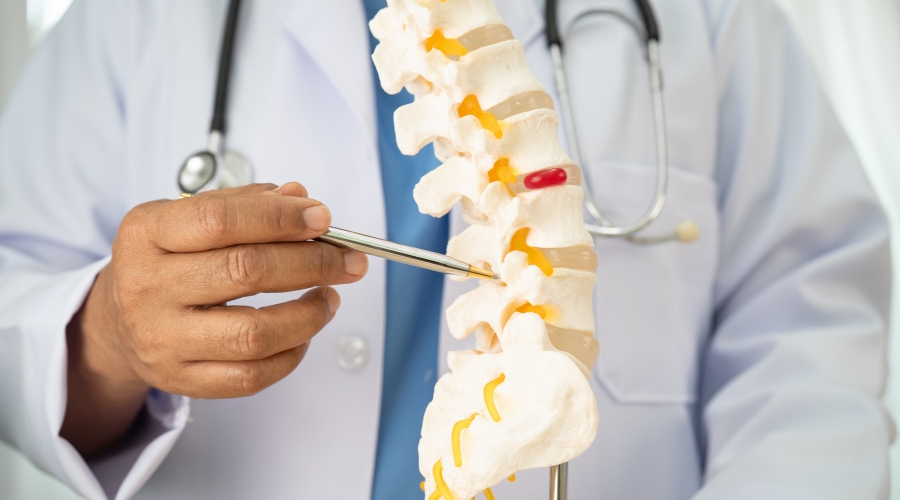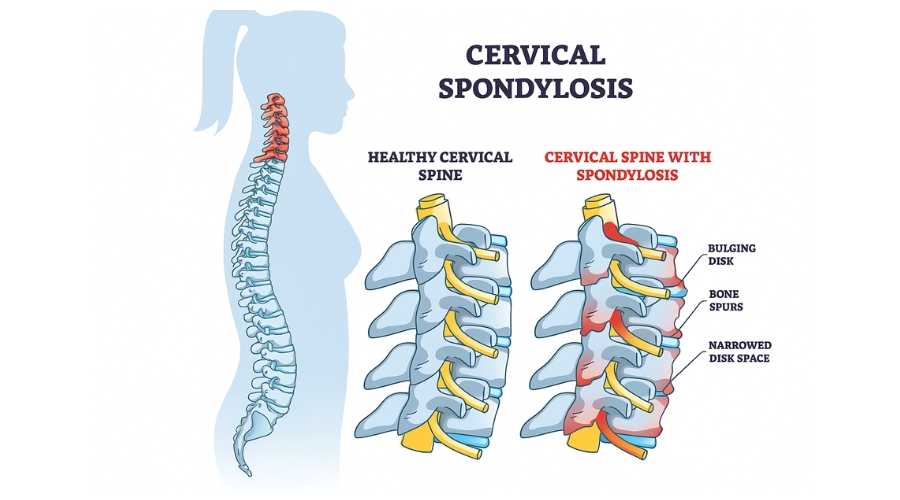Persistent neck pain, stiffness, or tingling in the arms can leave you worried and uncomfortable. If you’re thinking about visiting a cervical spondylosis doctor in Mumbai, knowing what to expect can help ease that anxiety. Whether it’s your first experience at a spine clinic or you’ve tried multiple remedies with no relief, this guide will walk you through your first consultation with a spine specialist.
Neck-related problems are increasingly common among working professionals, parents juggling routines, and older adults facing wear and tear. But timely diagnosis and treatment can prevent long-term damage.
Let’s help you feel confident about taking that first step.
Why You Might Need to See a Specialist for Neck Pain
Most people experience occasional neck discomfort. But if your pain becomes regular, spreads to the shoulders or arms, or affects daily activities, it may point to something more serious like cervical spondylosis.
This condition involves age-related changes in the bones and discs of the neck. While wear and tear are normal with age, some people develop nerve compression, inflammation, or joint stiffness that demands medical attention.
Common signs that you should consult a spine specialist in Mumbai include:
- Stiffness in the neck, especially in the morning
- Tingling or numbness in the arms or fingers
- Pain that worsens with movement or long hours at a desk
- Dizziness or balance issues
- Muscle weakness in the arms
Understanding the Condition Before the Visit
It helps to know a bit about the condition before you visit your cervical spondylosis doctor in Mumbai.
What Is Cervical Spondylosis?

Cervical spondylosis refers to degenerative changes in the cervical spine, which includes the bones (vertebrae), discs, and joints in the neck. It’s a very common cause of neck pain in adults, especially after 40.
Causes of Cervical Spondylosis
Several factors can lead to these degenerative changes:
- Age-related disc degeneration: The discs between your vertebrae lose hydration and flexibility.
- Bone spurs: As the spine tries to repair itself, extra bone growth can press on nearby nerves.
- Poor posture: Long hours on the phone or computer can strain the neck.
- Previous injuries: Past accidents or trauma can speed up degeneration.
- Genetics: A family history of spinal problems can increase your risk.
- Occupational stress: Jobs involving heavy lifting or repetitive neck movements may contribute.
Symptoms of Cervical Spondylosis You Shouldn’t Ignore
The symptoms can vary depending on which part of the spine is affected and whether any nerves are involved.
Some of the most reported complaints include:
- Persistent or sharp neck pain
- Neck stiffness or limited mobility
- Headaches starting from the neck region
- Tingling or numbness in the shoulders, arms, or fingers
- Muscle weakness or heaviness in the limbs
- Difficulty maintaining balance while walking
If you’re experiencing any of these, it’s best to consult a neck pain specialist in Mumbai to rule out more serious issues like spinal cord compression.
What Happens During Your First Consultation
Visiting a spine clinic for the first time might feel overwhelming, but understanding the process can make it easier.
Here’s what you can expect:
1. Detailed Medical History Review
The specialist will begin by asking about your symptoms, duration, daily routine, and lifestyle. Be honest about your habits, even if you think they’re unrelated. Things like long phone use, sleep positions, or exercise routines offer important clues.
You may be asked:
- When did the pain begin?
- Is it constant or does it come and go?
- Do any specific movements trigger discomfort?
- Are you experiencing numbness, dizziness, or weakness?
2. Physical Examination
This helps check your neck movement, reflexes, muscle strength, and signs of nerve involvement. You may be asked to:
- Turn your neck from side to side
- Raise or stretch your arms
- Walk a few steps to assess balance and coordination
The goal here is to check how your spine and nervous system are functioning.
3. Diagnosis of Cervical Spondylosis
If the symptoms and physical exam suggest cervical spondylosis, further tests may be recommended.
Common diagnostic tools include:
- X-ray: To check for disc space narrowing or bone spurs
- MRI scan: Offers a detailed view of nerves, discs, and soft tissues
- CT scan: Useful for more complex bone-related cases
- Nerve conduction studies: If nerve damage is suspected
These tests help your spine specialist in Mumbai confirm the diagnosis and understand how advanced the condition is.
Common Questions Patients Ask During Their Visit
Many patients feel nervous or unsure during their first appointment. That’s completely normal. Bringing a list of your symptoms or questions can help you make the most of the consultation.
Patients often ask:
- Do I need surgery?
- Can this be managed without medicines?
- Will physiotherapy help?
- Can I continue working or exercising?
- How long will recovery take?
You should feel comfortable asking anything. A good specialist, like Dr. Rakesh Dhake, will explain things patiently and guide you through your options.
Non-Surgical Treatment Options You May Be Offered
Most patients with cervical spondylosis do not require surgery. Your doctor will usually suggest a combination of the following:
1. Physiotherapy for Cervical Spondylosis
Exercises improve flexibility, posture, and neck muscle strength. This reduces strain and pain over time.
2. Lifestyle Changes
You might be advised on posture correction, ergonomic work setups, and avoiding activities that worsen symptoms.
3. Medication
Pain relievers, anti-inflammatory drugs, or muscle relaxants may be used for short-term relief.
4. Neck Support or Collar
In some cases, a cervical collar is used to limit movement and allow healing.
5. Injections
For severe inflammation or nerve compression, steroid injections might be considered.
Surgery is usually reserved for those with progressive nerve damage or when all other methods fail.
Benefits of Visiting a Cervical Spondylosis Doctor in Mumbai
Getting professional help early can make a big difference. Some benefits include:
- Accurate diagnosis using the right tests
- Clear understanding of your condition
- Access to non-surgical treatment for neck pain
- Personalised therapy and follow-ups
- Preventing worsening of symptoms
If you’re unsure whether you need a specialist, remember that early care often avoids long-term complications.
Preparing for Your First Visit: What You Can Do
- Carry any previous medical reports or X-rays
- List your symptoms and how they affect your daily life
- Wear comfortable clothing
- Prepare questions about your condition and treatment
Your visit is more than a diagnosis it’s the first step toward relief and recovery.
FAQs
Q1. What is the best way to confirm cervical spondylosis?
Answer: MRI is the most reliable test as it shows soft tissues, discs, and nerves clearly.
Q2. Can cervical spondylosis cause dizziness?
Answer: Yes, if blood flow or nerve signals from the neck are affected, you may experience dizziness or balance issues.
Q3. Is it safe to do neck exercises at home?
Answer: Always consult your spine specialist before doing neck exercises. Wrong posture can worsen the problem.
Q4. How long does cervical spondylosis take to heal?
Answer: Recovery varies depending on severity, but many patients improve within a few weeks with proper treatment.
Q5. Should I worry about surgery?
Answer: Surgery is usually not the first choice. Most cases respond well to physical therapy and posture correction.
Q6. Can working on a laptop all day worsen it?
Answer: Yes. Poor posture during prolonged desk work is a common trigger. Your doctor may advise ergonomic corrections.
Q7. Do I need to stop gym or yoga?
Answer: Not necessarily. You may need to modify your routine. Avoid neck-heavy exercises until cleared by your doctor.
Making the Right Move for Your Neck Health
Ignoring neck pain or stiffness doesn’t make it go away. If anything, it often gets worse over time. Whether you’re dealing with discomfort after long work hours, disturbed sleep due to neck stiffness, or tingling in your arms it’s important to get the right help at the right time.
Visiting a cervical spondylosis doctor in Mumbai is the first step towards understanding what’s really happening inside your spine. A personalised evaluation can reveal whether the problem is mild, moderate, or needs more focused treatment.
Dr. Rakesh Dhake and the team at Zen Spine focus on helping patients find non-surgical, practical solutions to manage cervical spine conditions safely and effectively.
If you’re unsure whether your symptoms need medical attention, this consultation could offer the clarity you’ve been looking for.
Take that step forward. Your neck and your future self will thank you.





